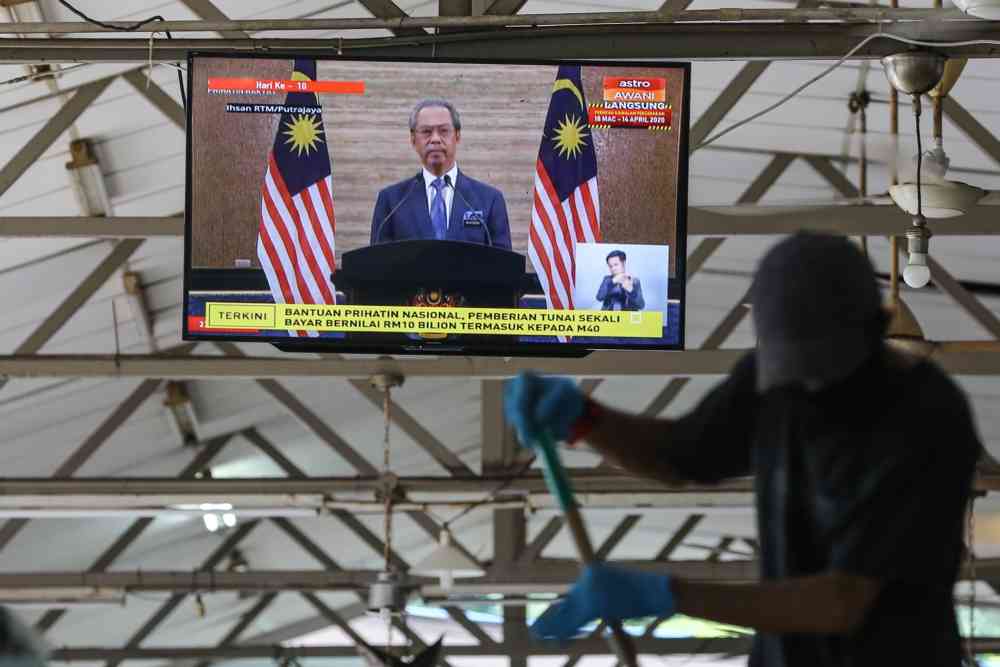KUALA LUMPUR, March 28 — Analysts agree that the RM250 billion stimulus package unveiled by Prime Minister Tan Sri Muhyiddin Yassin yesterday is no doubt aimed at touching the hearts of Malaysians who have been struggling under the effects of the Covid-19 outbreak.
Most analysts, both economic and political, concur that the new government had come through with its promise that no Malaysian will be left behind in the second stimulus package that rivalled that of an annual government Budget and was more “luxurious” than the 1Malaysia cash aid (BR1M).
“He is doing his best to reduce the impact of the Covid-19 pandemic on Malaysians. He is trying to introduce different relief packages to different segments of society,” said University Malaysia Sabah’s Lee Kuok Tiung in reference to Muhyiddin.
“As we all know, not all aid goes through different layers of our heterogeneous society. The moratorium, for example, will be very significant and meaningful to the middle class and B40,” he said in commending the stimulus package that he said covered almost every community in need.
Lee added it was only right to reward frontliners and healthcare workers with a special allowance and make sure they get their overtime pay for their sacrifice, along with students who are also struggling during the lockdown, and government servants.
“The lockdown also means utility bills will go up so everyone can appreciate the discount.
“Basically, the economic stimulus package offers more aid that directly benefits the people. It is to reduce the people's burden. It’s designed for the short-term to help everyone get through the difficult situation and is based on a one-off concept.
“Of course, it would not be suitable for the long-term. The package is more luxurious than BR1M,” he said.
Senior fellow at the Singapore Institute of International Affairs Oh Ei Sun also said that the handouts would please the majority of Malaysians.
“It may keep people afloat and tide us over during the MCO period but we don’t know about afterwards.
“Cannot say not enough, but business is bad amidst uncertainties. We don’t know what is the scale of the disaster and how much is lost. We won’t know the effects because our economy is open and subject to vagaries of the global economic slowdown,” he said.
University Malaysia Sabah economist James Alin said that while the intentions behind spending some RM250 billion of taxpayers’ money on those in need was good and a morale boost, it was counterproductive to allow people to withdraw their EPF savings.
“The suggestion to withdraw EPF, however, is very disappointing — the people are suffering and Muhyiddin is encouraging them to withdraw their only savings for old age? That’s ridiculous!” he added.
He cautioned that the fiscal injection that increases monetary supply or spends taxpayers’ money could mean higher taxation after the next general election.
“A better way to provide relief to those who are suffering is by cutting all types of tax.
“A large portion of that ‘borrowed’ taxpayers’ money — it’s borrowed from future generations — should be invested in research and development to find a cure for dangerous contagious diseases like Covid-19 and to pay for our own flu jab technology,” he said.
Alin, who commended Muhyiddin and his Cabinet for donating two months of their salary to Covid-19 funds, suggested that the prime minister cut his and his Cabinet’s salaries immediately.
“His Cabinet is bloated. Imagine how much money can be saved and could be spent on better use, say, helping the very poor to weather the epidemic?” he said.
Universiti Malaysia Sabah’s Wan Syawalludin Wan Hassan also expressed some concerns that the approach, although generous and well-intentioned, would create mass movements of people when the cash comes through.
“My worry is that it will defeat the purpose of the government's lockdown effort. There will definitely be many in town on April 1, 2020 to collect the money from the bank.
“I also don’t think it covers everyone, especially those pakcik and makcik from rural areas. They should try to assist the poor who really are in need. Those who live hand-to-mouth and really depend on a daily income. No work, no pay like now during the lockdown,” he said.



















